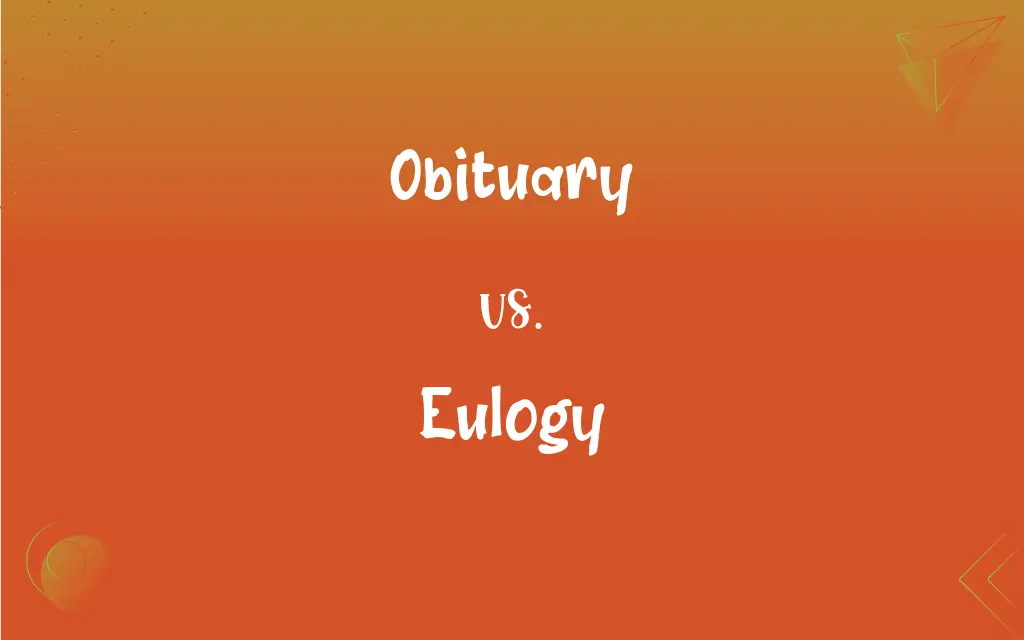Obituary vs. Eulogy: What's the Difference?
Edited by Aimie Carlson || By Janet White || Published on November 8, 2023
An obituary is a published notice of someone's death, often with a brief biography, while a eulogy is a spoken tribute praising a person at their funeral or memorial service.

Key Differences
An obituary and a eulogy both serve to remember and honor the deceased, but they have distinct purposes and mediums. An obituary is typically a written notice of someone's passing, often appearing in newspapers or online platforms. It provides essential details about the individual, such as their age, family members, significant achievements, and sometimes the cause of death. In contrast, a eulogy is a verbal tribute, often delivered by someone close to the deceased during a funeral or memorial service, focusing on their virtues, memories, and the impact they had on others.
The content and tone can differ between an obituary and a eulogy. Obituaries are more factual, detailing the life events, accomplishments, and surviving family members of the deceased. They maintain a formal and informative tone. On the other hand, a eulogy is more personal and emotional, recounting anecdotes, shared experiences, and the personal qualities that made the individual unique and cherished.
The audience for obituaries and eulogies also varies. An obituary, being a public notice, is accessible to anyone, from close family to distant acquaintances or even strangers, especially when published in widely-read mediums. A eulogy, being part of a funeral service, is generally addressed to the gathered mourners, including family, friends, and others who knew the deceased personally.
In terms of duration and detail, obituaries are concise, providing a snapshot of the person's life, while eulogies can be more extended, delving into personal stories, shared memories, and the deeper essence of who the individual was. Eulogies allow for more expressive sentiments, giving attendees a sense of closure and comfort.
Comparison Chart
Medium
Written, often published in newspapers.
Spoken, delivered at funerals or memorials.
ADVERTISEMENT
Content
Factual, biographical details.
Personal, anecdotal, and emotional.
Audience
General public.
Funeral attendees, usually close ones.
Tone
Formal and informative.
Personal and expressive.
Duration and Depth
Concise, providing a life snapshot.
Longer, delving into memories and attributes.
Obituary and Eulogy Definitions
Obituary
A death notice placed in a publication.
I read the obituary of my former teacher in today's paper.
ADVERTISEMENT
Eulogy
An expression of praise and admiration for someone who has passed.
The heartfelt eulogy brought tears to many eyes.
Obituary
A written tribute to someone who has recently passed away.
The obituary captured the essence of his vibrant life and personality.
Eulogy
A commendatory oration or writing in honor of the deceased.
The eulogy captured his spirit, humor, and dedication to family.
Obituary
A published notice of a person's death.
Her obituary appeared in the local newspaper the day after she passed away.
Eulogy
A speech praising someone, typically delivered at their funeral.
His best friend gave a moving eulogy at the service.
Obituary
A written account of someone's life and achievements after they've died.
The obituary highlighted his contributions to the community.
Eulogy
A spoken tribute celebrating the life of a deceased person.
The eulogy highlighted her endless kindness and warmth.
Obituary
An announcement of death, often accompanied by a brief biography.
The obituary detailed her early life, career, and charitable works.
Eulogy
A speech or piece of writing extolling the virtues of someone who has died.
Her eulogy was a touching reflection on a life well-lived.
Obituary
A published notice of a death, sometimes with a brief biography of the deceased.
Eulogy
A laudatory speech or written tribute, especially one praising someone who has died.
Obituary
A brief notice of a person’s death, as published in a newspaper.
Eulogy
High praise or commendation.
Obituary
A biography of a recently deceased person, written by a journalist and published in a newspaper.
Eulogy
An oration to honor a deceased person, usually at a funeral.
Obituary
A register of deaths in a monastery.
Eulogy
Speaking highly of someone or something; the act of praising or commending someone or something.
Obituary
Relating to the death of a person.
Eulogy
A speech or writing in commendation of the character or services of a person; as, a fitting eulogy to worth.
Eulogies turn into elegies.
Obituary
Of or pertaining to the death of a person or persons; as, an obituary notice; obituary poetry.
Eulogy
A formal expression of praise
Obituary
That which pertains to, or is called forth by, the obit or death of a person; esp., an account of a deceased person.
Obituary
A notice of the death of a person, published in a newspaper or other periodical, accompanied by a biographical sketch which may be brief ro extended; as, the funeral director arranged placed an obituary in the local papaer.
Obituary
The section of a newspaper in which obituaries{2} are printed; as, I saw the notice of his death in the obituaries.
Obituary
A list of the dead, or a register of anniversary days when service is performed for the dead.
Obituary
A notice of someone's death; usually includes a short biography
FAQs
Who typically delivers a eulogy?
A eulogy is usually delivered by a close family member, friend, or clergy member.
What is the primary purpose of an obituary?
An obituary serves as a public notice of someone's death and provides a brief overview of their life.
Are obituaries always written by family members?
No, obituaries can be written by family, friends,
Can there be multiple eulogies at a funeral?
Yes, multiple people can deliver eulogies, sharing different perspectives and memories.
Where are obituaries commonly published?
Obituaries are commonly published in newspapers, funeral home websites, or community bulletins.
About Author
Written by
Janet WhiteJanet White has been an esteemed writer and blogger for Difference Wiki. Holding a Master's degree in Science and Medical Journalism from the prestigious Boston University, she has consistently demonstrated her expertise and passion for her field. When she's not immersed in her work, Janet relishes her time exercising, delving into a good book, and cherishing moments with friends and family.
Edited by
Aimie CarlsonAimie Carlson, holding a master's degree in English literature, is a fervent English language enthusiast. She lends her writing talents to Difference Wiki, a prominent website that specializes in comparisons, offering readers insightful analyses that both captivate and inform.





































































